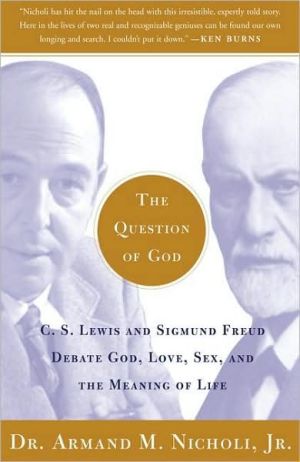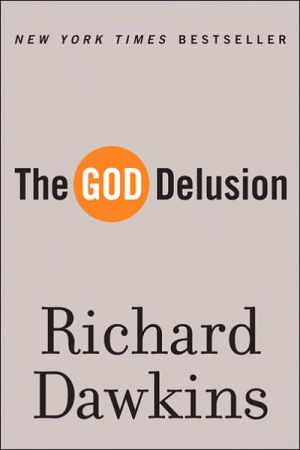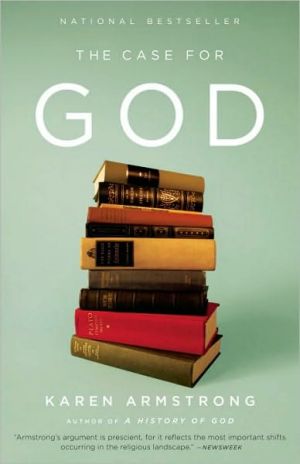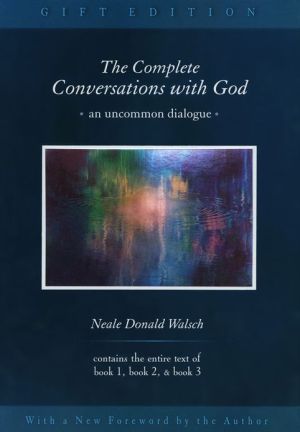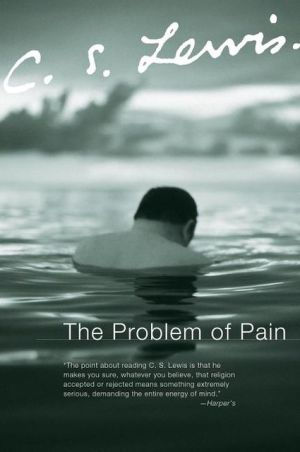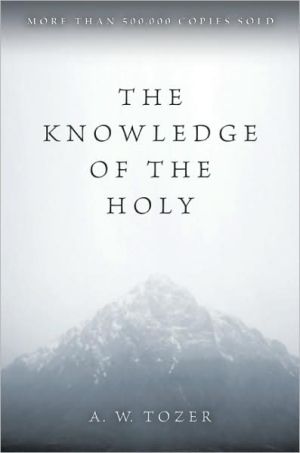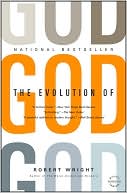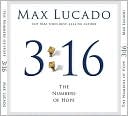The Question of God: C.S. Lewis and Sigmund Freud Debate God, Love, Sex, and the Meaning of Life
Throughout the ages, many of the world's greatest thinkers have wrestled with the concept of -- and belief in -- God. It may seem unlikely that any new arguments or insights could be raised, but the twentieth century managed to produce two brilliant men with two diametrically opposed views about the question of God: Sigmund Freud and C. S. Lewis. They never had an actual meeting, but in The Question of God, their arguments are placed side by side for the very first time. \ For more than...
Search in google:
Many of history's greatest thinkers have wrestled with the ultimate question of belief and nonbelief in God. Though it seemed unlikely that any new arguments could possibly be raised on either side, the twentieth century produced two men who each made brilliant arguments, one in favor of belief and one opposed -- Sigmund Freud and C. S. Publishers Weekly While Freud and C.S. Lewis never actually met, the atheistic theories of the psychoanalyst and well-known unbeliever are pitted against those of the Christian don in The Question of God: C.S. Lewis and Sigmund Freud Debate God, Love, Sex, and the Meaning of Life. Author Armand M. Nicholi Jr. is a Harvard Medical School psychiatry professor who has taught a class on the theological writings of Freud and Lewis for more than 25 years. In this accessible study, he outlines the lives of the two thinkers, both preoccupied with the question of god's existence, and compares how the two approach questions of conscience, happiness, pain and death. (Apr. 2) Copyright 2002 Cahners Business Information.
\ Prologue \ On the morning of September 26, 1939, at Golders Green in northwest London, a group of friends and family gathered to mourn the death of Sigmund Freud. After his body was cremated, Ernest Jones, in his funeral oration, noted that "he was being buried...[as] he would have wished...in sheer simplicity, without a note of pomp or ceremony." Stefan Zweig, the author, closed his remarks by predicting that "wherever we seek to advance into the labyrinth of the human heart, henceforth his intellectual light will shine upon our path."\ The front page of the Sunday New York Times declared in a headline: "Dr. Sigmund Freud Dies in Exile at 83." And in the subheadlines: "Founder of Psychoanalysis...Succumbs at His Home Near London." The article described his recent escape from the Nazis, who burned his books, dismissed his theories as pornographic, and demanded a ransom for his freedom. It also mentioned Freud's "worldwide fame and greatness," referring to him as "one of the most widely discussed scientists," mentioning that "he set the entire world talking about psychoanalysis" and noting that his ideas had already permeated our culture and language.\ As a young teenager, Freud demonstrated academic brilliance, ranking at the top of his class for seven years and graduating summa cum laude from the "Gymnasium." He entered the University of Vienna when seventeen years old, read widely in several languages, conducted research, and studied subjects ranging from physics to philosophy.\ Today historians rank Freud's scientific contributions with those of Planck and Einstein. He appears on most lists of the greatest physicians in history. He was recently on the cover of Time (with Albert Einstein) for an issue dedicated to the greatest scientific minds of the century and ranked sixth in a book on the hundred most influential scientists. Yet if Freud's fame and influence have continued to grow since his death more than sixty years ago, so have the criticism and the controversy surrounding him. He persists in spite of it all. Freud's photo graces Austrian currency. His ideas remain permanently embedded in our culture and our language.\ We use terms such as ego, repression, complex, projection, inhibition, neurosis, psychosis, resistance, sibling rivalry, and Freudian slip without even realizing their source. Freud's model of the mind is still perhaps the most developed of all. Of the more than one hundred forms of psychotherapy, many continue to use one or another of Freud's concepts. Perhaps most important of all, his theories influence how we interpret human behavior, not only in biography, literary criticism, sociology, medicine, history, education, and ethics -- but also in the law. We now take for granted the basic psychoanalytic concept that our early life experiences strongly influence how we think, feel, and behave as adults. Because of the unmistakable impact of his thought, some scholars refer to the twentieth century as the "century of Freud."\ As part of his intellectual legacy, Freud strongly advocated an atheistic philosophy of life. He referred to this view as the "scientific Weltanschauung." Freud also waged a fierce, ongoing battle against the spiritual worldview that he referred to as "the religious Weltanschauung." Freud's philosophical writings, more widely read than his expository or scientific works, have played a significant role in the secularization of our culture. In the seventeenth century people turned to the discoveries of astronomy to demonstrate what they considered the irreconcilable conflict between science and faith; in the eighteenth century, to Newtonian physics; in the nineteenth century, to Darwin; in the twentieth century and still today, Freud is the atheist's touchstone.\ *\ • *\ Twenty-four years after Freud's death, on the morning of November 26, 1963, at Oxford, England, northwest of London, a group of friends and family gathered at the Holy Trinity Church at Headington Quarry to mourn the death of C. S. Lewis. The service began with the quote "I am the resurrection and the life, saith the Lord." After the service, the group walked slowly into the cold, clear day, and watched silently as the coffin was carried from the church to the churchyard for burial.\ The New York Times of November 25, 1963, amid numerous articles on the assassination of John F. Kennedy, announced in a headline: "C. S. Lewis Dead: Author, Critic 64." Under a photo, and an article of several columns, the Times surveyed Lewis's prolific life, mentioned his reputation as a brilliant scholar, reviewed some of his scholarly and popular works that had already sold millions of copies, and noted that his success as a writer occurred after his change of worldviews, from atheist to believer.\ Lewis, the celebrated Oxford don, literary critic, and perhaps the twentieth century's most popular proponent of faith based on reason, won international recognition long before his death in 1963. During World War II, his broadcast talks made his voice second only to Churchill's as the most recognized on the BBC. A few years after the war, a cover article in Time magazine described him as the most influential spokesman for the spiritual worldview. His books continue to sell prodigiously and his influence continues to grow. During 1998, the centennial year of his birth, conferences focusing on his work were held throughout the United States and Europe. His extraordinarily popular Chronicles of Narnia ignites the imagination of children around the world. The sheer quantity of personal, biographical, and literary books and articles on Lewis, the vast number of C. S. Lewis societies in colleges and universities, and Shadowlands, the award-winning London and Broadway plays and the movie based on his life -- all attest to the ever-growing interest in the man and his work.\ Lewis began his brilliant academic career as an undergraduate student at Oxford, where he won a triple first, the highest honors in three areas of study -- a feat seldom achieved. After finishing his studies, he stayed on at Oxford as a member of the faculty. For the next thirty years, he taught philosophy and then English language and literature. In 1955, he left Oxford to accept a chair in medieval and Renaissance English literature at Magdalene College, Cambridge University. At both Oxford and Cambridge, his immensely popular lectures often filled lecture halls to standing room only.\ Lewis embraced an atheistic worldview for the first half of his life and used Freud's reasoning to defend his atheism. Lewis then rejected his atheism and became a believer. In subsequent writings, he provides cogent responses to Freud's arguments against the spiritual worldview. Wherever Freud raises an argument, Lewis attempts to answer it. Their writings possess a striking parallelism. If Freud still serves as a primary spokesman for materialism, Lewis serves as a primary spokesman for the spiritual view that Freud attacked.\ Sadly the two men never debated directly. When Lewis began teaching at Oxford, he was in his twenties, and Freud was already in his mid-seventies. Lewis was well aware of Freud's theories; the new psychology was widely discussed. Even earlier, by the time Lewis enrolled as an undergraduate at Oxford, Freud had already become father of the new literary criticism that Lewis studied. Later, Freud may very well have read some of Lewis's early writings -- such as The Allegory of Love, published to critical acclaim several years before Freud died. He may have read Lewis's Pilgrim's Regress, in which Lewis satirizes Freudian psychology. Lewis named one of the characters Sigismund, Freud's real name until, at the age of twenty-two, he changed it to Sigmund.\ Unfortunately, because Lewis trailed Freud by a generation, his responses to Freud's arguments were the last written word. Freud never had the chance to rebut. Yet if their arguments are placed side by side, a debate emerges as if they were standing at podiums in a shared room. Both thought carefully about the flaws and alternatives to their positions; each considered the other's views.\ Thirty years ago, Harvard invited me to teach a course on Freud. I have been teaching it ever since to the undergraduates, and also for the last ten years to the Harvard Medical School students. At first, the course focused solely on Freud's philosophical views. Roughly half of my students agreed with him, the other half strongly disagreed. When the course evolved into a comparison of Freud and Lewis, it became much more engaging, and the discussions ignited. I have been teaching it that way ever since. I found, however, that a third voice needs to be added to that of their writings, in the form of their biographies. Their arguments can never prove or disprove the existence of God. Their lives, however, offer sharp commentary on the truth, believability, and utility of their views. (In analyzing their biographies, however, we do well to keep in mind that human beings do not always live what they profess, nor profess what they live.)\ *\ • *\ The purpose of this book is to look at human life from two diametrically opposed points of view: those of the believer and the unbeliever. (Freud divided all people into these two catagories.) We will examine several of the basic issues of life in terms of these two conflicting views. We will look at both views as objectively and dispassionately as possible and let the arguments speak for themselves. (I am aware that no one -- including the author -- is neutral on such emotionally charged issues. None of us can tolerate the notion that our worldview may be based on a false premise and, thus, our whole life headed in the wrong direction.) Because of the far-reaching implications for our lives, we tend to dismiss and contradict arguments for the worldview we reject. I hope each reader will critically assess the arguments of both Freud and Lewis and follow Sir Francis Bacon's advice to "Read not to contradict...but to weigh and consider."\ Socrates said "the unexamined life is not worth living." Within the university, students and professors scrutinize every possible aspect of our universe -- from the billions of galaxies to subatomic particles, electrons, quarks -- but they assiduously avoid examining their own lives. In the wider world, we keep hectically busy and fill every free moment of our day with some form of diversion -- work, computers, television, movies, radio, magazines, newspapers, sports, alcohol, drugs, parties. Perhaps we distract ourselves because looking at our lives confronts us with our lack of meaning, our unhappiness, and our loneliness -- and with the difficulty, the fragility, and the unbelievable brevity of life. Pascal may have been right when he observed that "if our condition were truly happy we should not need to divert ourselves from thinking about it...the sole cause of our unhappiness is that we do not know how to sit quietly in our room." One of my Harvard students stated during a class discussion that "living a human life is a scary business." Perhaps the reason we find it difficult to sit quietly and examine our lives is because doing so makes us anxious. But until we examine our lives, we can do little to make them less unhappy and more fulfilling. It is my hope that Freud and Lewis can jointly guide us through just such an examination.\ *\ • *\ Whether we realize it or not, all of us possess a worldview. A few years after birth, we all gradually formulate our philosophy of life. Most of us make one of two basic assumptions: we view the universe as a result of random events and life on this planet a matter of chance; or we assume an Intelligence beyond the universe who gives the universe order, and life meaning. Our worldview informs our personal, social, and political lives. It influences how we perceive ourselves, how we relate to others, how we adjust to adversity, and what we understand to be our purpose. Our worldview helps determine our values, our ethics, and our capacity for happiness. It helps us understand where we come from, our heritage; who we are, our identity; why we exist on this planet, our purpose; what drives us, our motivation; and where we are going, our destiny. Some historians of science such as Thomas Kuhn point out that even a scientist's worldview influences not only what he investigates but also how he interprets what he investigates. Our worldview tells more about us perhaps than any other aspect of our personal history.\ Both Freud's and Lewis's views have existed since the beginning of recorded history -- the spiritual worldview, rooted primarily in ancient Israel, with its emphasis on moral truth and right conduct and its motto of Thus saith the Lord; and the materialist or "scientific" worldview, rooted in ancient Greece, with its emphasis on reason and acquisition of knowledge and its motto What Says Nature? All of us embrace some form of Freud's or Lewis's worldview. If we accept Freud's materialism, we may call ourselves atheists, agnostics, or skeptics. There are likewise many different expressions of Lewis's worldview. We will consider the specific form of the spiritual worldview embraced by Lewis and, according to a recent Gallup poll, by more than 80 percent of Americans.\ Why Freud and Lewis? For several reasons. First, both write extensively about a specific, representative worldview with great depth, clarity, and conciseness. Freud won the coveted Goethe Prize for literature, and Lewis became a professor of literature, a noted literary critic, and a widely read, prolific author. Furthermore, both wrote autobiographies and thousands of letters that provide a reasonably good perspective on how they lived their lives. Freud and Lewis provide a particularly clear lens through which we can examine these two views.\ Are these worldviews merely philosophical speculations with no right or wrong answer? No. One of them begins with the basic premise that God does not exist, the other with the premise that He does. They are, therefore, mutually exclusive -- if one is right, the other must be wrong. Does it really make any difference to know which one is which? Both Freud and Lewis thought so. They spent a good portion of their lives exploring these issues, repeatedly asking the question "Is it true?"\ Freud was preoccupied with the question of whether or not God exists. In a collection of letters he wrote as a college student at the University of Vienna, the question of God's existence arises constantly. It continues throughout his philosophical writings until his last major work, Moses and Monotheism. In "The Question of a Weltanschauung," Freud argues against the existence of God. He points to the problem of suffering and he develops the psychological argument that the whole concept is nothing but a projection of a childish wish for parental protection from the vicissitudes and sufferings of human existence. He also argues against the objection of those holding the spiritual worldview that faith "is of divine origin and was given us as a revelation by a Spirit which the human spirit cannot comprehend." Freud says this "is a clear case of begging the question" and adds this comment: "The actual question raised is whether there is a divine spirit and a revelation by it, and the matter is certainly not decided by saying this question cannot be asked."\ Lewis agrees with Freud that this is indeed the most important question. He writes: "Here is a door behind which, according to some people, the secret of the universe is waiting for you. Either that's true or it isn't. If it isn't, then what the door really conceals is simply the greatest fraud...on record." Because so many people embrace Lewis's answer -- a recent Gallup poll reports that the vast majority of adult Americans believe in God -- Lewis is right: if not true, then the spiritual worldview is not only a fraud but also the cruelest hoax ever perpetrated on the human race. And the only alternative is to follow Freud's advice to grow up and face the harsh reality that we are alone in the universe. He says we may find less consolation, but the truth, harsh as it is, will ultimately set us free from false hopes and unrealistic expectations. But if the spiritual worldview is true, then all other truth fades in significance. Nothing has more profound and more far-reaching implications for our lives.\ If both Freud and Lewis thought the question of God's existence to be life's most important question, let's see how they arrived at their conflicting answers. And let's see if their biographies -- how they actually lived their lives -- strengthen or weaken their arguments and tell us more than their words convey.\ Copyright © 2002 by Armand Nicholi
Prologue11The Protagonists: The Lives of Sigmund Freud and C. S. Lewis132The Creator: Is There an Intelligence Beyond the Universe?363Conscience: Is There a Universal Moral Law?574The Great Transition: Which Road to Reality?765Happiness: What Is the Source of Our Greatest Enjoyment in Life?976Sex: Is the Pursuit of Pleasure Our Only Purpose?1267Love: Is All Love Sublimated Sex?1608Pain: How Can We Resolve the Problem of Suffering?1879Death: Is Death Our Only Destiny?216Epilogue240Notes245Bibliography282Acknowledgments286Index287
\ From Barnes & NobleSigmund Freud and C.S. Lewis never had the pleasure of meeting. But if the two famous men had gotten together, they probably would have intensely debated the existence of God. Here, Armand Nicholi simulates such a discussion, pitting Freud's secularism against the spirituality of Lewis.\ \ \ \ \ From the Publisher\ The Boston Herald Although there's no record of Freud and Lewis actually meeting...Nicholi makes readers wish they had in this earnest and thought-provoking volume.\ \ \ Publishers WeeklyWhile Freud and C.S. Lewis never actually met, the atheistic theories of the psychoanalyst and well-known unbeliever are pitted against those of the Christian don in The Question of God: C.S. Lewis and Sigmund Freud Debate God, Love, Sex, and the Meaning of Life. Author Armand M. Nicholi Jr. is a Harvard Medical School psychiatry professor who has taught a class on the theological writings of Freud and Lewis for more than 25 years. In this accessible study, he outlines the lives of the two thinkers, both preoccupied with the question of god's existence, and compares how the two approach questions of conscience, happiness, pain and death. (Apr. 2) Copyright 2002 Cahners Business Information.\ \ \ \ \ Library JournalOver the years, a number of good biographies of Lewis, the perennially popular Christian apologist, have been published. George Sayer's Jack: A Life of C.S. Lewis is probably the least controversial of them, while A.N. Wilson's C.S. Lewis: A Biography is likely the most. This portrait by Downing (English, Elizabethtown Coll.; Planets in Peril) is unique in that it treats one aspect of Lewis's life: his conversion from atheism to Christianity. Focusing on his subject's inner journey, Downing considers the effect on Lewis of his mother's death; his estrangement from his father; the influence of a rationalist, atheistic, but well-loved mentor; his early interest in the occult and paranormal; and the trench warfare he experienced in World War I. Making use of both published and unpublished writings, Downing shows a deep understanding of Lewis and writes in a flowing style. For more than 25 years, Nicholi (psychiatry, Harvard Medical Sch.) has offered a course in which he compares the thought and life of the atheist Freud with that of Lewis as a way to consider questions about the existence of God, love, sex, and the meaning of life. Nicholi generally maintains a balanced view, letting Freud's and Lewis's words and actions speak for themselves. He examines why Freud remained an unbeliever (though not an unthinking one) and why Lewis accepted Christianity. While his sympathies obviously lie on the side of faith, Nicholi nevertheless offers a balanced view of Freud. Both books are well written and worthy additions to the rapidly growing literature on Lewis, although Nicholi's will probably appeal to a broader audience. Augustine J. Curley, Newark Abbey, NJ Copyright 2002 Cahners Business Information.\ \ \ \ \ Kirkus ReviewsA careful examination of two major, and conflicting, currents of modern thought. Those currents, in the view of Nicholi (Psychiatry/Harvard Medical School), turn on the question of whether God exists. The founder of modern psychotherapy thought not; Sigmund Freud held that the belief in an "idealized Superman" is "so patently infantile and so foreign to reality that . . . it is painful to think that the great majority of mortals will never rise above this view of life," asserting that only scientific education could turn people away from "the fairy tales of religion." British writer and popular theologian C.S. Lewis argued in the affirmative, having turned from youthful atheism to a more or less orthodox Christianity in middle life and becoming preoccupied thereafter with the "questions of how to escape corruption in living and how in death to give meaning to life." Setting these thinkers in opposition is admittedly an artificial construct; it can be objected that Freud (1856-1939) and Lewis (1898-1963) were two generations apart and did not publicly debate each other. (Although Nicholi speculates that they might have met briefly at the very end of Freud's life.) Einstein and Muggeridge, Bohr and Schweitzer, or even Sagan and Tolkien might have done just as well in serving as spokesmen for their respective causes and in making the author's point. Yet Nicholi ably makes his case for pairing Freud with Lewis, and his essay takes inspired turns as he examines how believers and nonbelievers think about such thorny matters as forgiving those who have trespassed against us, dealing with the pain the world deals us, and even loving ourselves. Palatable food for thought for readers preoccupiedwith life's big, ultimately insoluble questions.\ \
